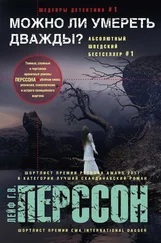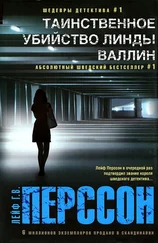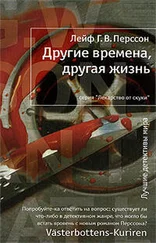“Because the prime minister apparently intends to appoint her as a member of the government,” said Wiklander, “and considering her new security level she wouldn’t be handling consumer issues or social insurance,” Wiklander added. What in the name of God should I do? he thought.
Christ, thought Johansson. It was already pretty late anyway, he thought, but naturally he didn’t say that. Acting prime minister... coordination minister... or perhaps even foreign minister or defense minister? And it didn’t matter which, considering the problem that had just surfaced.
“Not a word to anyone, Wiklander,” said Johansson, pointing at his coworker with his whole hand. “Not a word to anyone. Is that understood?”
Now it was a matter of thinking, and thinking sharp, thought Johansson.
Seems like old shit has landed in a new fan, thought Johansson half an hour later when he was through thinking. Then he quickly made three decisions, which he made sure to carry out immediately.
First he informed his boss, the general director, of the unfortunate coincidence between his and Wiklander’s investigation and the prime minister’s impending appointment. Johansson was not stupid, and because he intended to go further, he wanted to make sure he had all the clearance he could need.
The GD might not have been as cunning as Johansson, for he had seemed almost energized by the news, and when he stated his one, concrete wish, which was to be informed of developments as the case proceeded, it was with curiosity shining from his eyes.
“Of course, Boss,” said Johansson, who could not have asked for more.
Next Johansson had a directive issued to his coworkers who were conducting the background checks on Stein. Not a comma — regardless of content or intent — that concerned Helena Lovisa Stein could now leave the building without his approval. And if anyone in Rosenbad was wondering about anything — even if they just wanted to know what time it was — they should be referred to Johansson.
I need people too, thought Johansson. Not that many, but enough, and only the best. People who can work uninterruptedly until this is cleared up and who can fulfill their assignments despite the fact that the person who leads the assignment may be compelled to withhold information that the team members, for various reasons, may not or should not know about.
“Do you think you can arrange it?” said Johansson, nodding at Wiklander.
“Yes,” said Wiklander. “It’s already done. I’ve already assigned everyone we need.”
The third decision was the most difficult, and so it had to wait until last. Johansson steeled himself and called Berg at home, and surprisingly enough Berg himself answered.
“I’m sorry to disturb you,” said Johansson, “but I need to see you immediately.”
“Then I suggest you come over to my place,” said Berg. His voice sounded tired and muted, but he did not seem particularly surprised.
“Sit down,” said Berg half an hour later, pointing toward the empty armchair in his office. “Would you like coffee?”
“Not unless you’re having some,” said Johansson. You’re dying, he thought, and it was more a statement than an expression of sorrow or even emotion. Pull yourself together, Johansson thought, and it was himself and not Berg he was thinking about.
“Then we won’t have coffee,” said Berg, smiling wanly as he carefully sat down in a straight-backed chair across from the armchair he had shown his guest.
“What can I help you with?” Berg asked.
“Putting some order into old recollections from another time,” said Johansson.
“It’s about the West German embassy, isn’t it,” said Berg, and this was more a statement than a question.
“Yes,” said Johansson.
“Then I’ll tell you the whole story,” said Berg.
Erich Honecker had fooled them all. They never believed he would have dared, but he’d done it, and considering the life he’d lived and the dangers he had undergone, maybe it wasn’t really so strange that he had taken the risk. After that, everything he had done followed a simple logic, and in principle it was all based on keeping his opponents in the dark. He had succeeded far beyond expectations, most likely because of something as simple as the fact that those he fooled had lived different, more secure lives than he had.
At the Party conference in Dresden in September 1977, in his speech to the members, Honecker had distanced himself firmly from West German terrorism, and the old shawm player had not minced words when he did so: “These despicable hordes of anarchists and terrorists who are wreaking havoc in the Federal Republic make it possible for the West German regime to silence the political left in the country under the pretext of battling so-called terrorist sympathizers.”
Predictable rhetoric, to be sure, but also an official confirmation of what the Western security agencies, all the way from those most closely affected — the West German Federal Crime Agency and Federal Intelligence Service — to the Americans at the CIA and NSA, already thought they had figured out. It was the Arabs who were helping the European terrorists. The Russians, certain of their satellites in the Warsaw Pact, might possibly be suspected of having supplied them with money, weapons, and explosives on some occasion — in a pinch, and by complicated paths — but not the East Germans. They would never have dared. And now Honecker had put his honor at stake that his country was not involved with such things.
Actually, the West German terrorists had been helped in ways both great and small for several years — with money and weapons, of course, but also with hiding places and training camps and military trainers from the People’s Army who drilled their West German comrades in advanced weapons techniques. Obviously Honecker himself had not been involved in such primitive activities in the slightest. Not Erich Honecker. That wasn’t how it worked. He had on the other hand given his approval for his old comrade in arms Erich Mielke, the head of the Stasi, a member of the government, and minister of state security, to take charge of the practical details.
For Mielke this was an obvious stage in the struggle against the capitalist opponent, and a man with his background had no problems whatsoever with the way the West Germans used the skills and resources he put in their hands. Not the young Communist Erich Mielke, who at the age of fourteen had already taken part in an armed revolt on the streets of Berlin against the conservatives in general and the Nazis in particular. Not the Communist Mielke who was only twenty-one years old when he committed his first political assassination and together with a comrade fatally shot two police chief inspectors and wounded an inspector in broad daylight in Berlin. Not Erich Mielke.
For Mielke it was a matter of helping comrades in the common struggle, and of the help they in turn could give him. Toward the end of his life, when everything had collapsed around him and he would be held accountable for what he saw as his cause and his life’s work, he had been content to say that perhaps he did not share their outlook on certain strategic and tactical questions, but that in any event they had been close to him in their view of capitalist society. Mielke and his closest collaborators considered the West German terrorists a kind of reserve force, which could be mobilized as resistance men and saboteurs in any war against West Germany and its allies. It was no more complicated than that.
Men like him and Honecker could keep their opponents in the dark because in all essentials they had a different background from their enemies. Horst Herold, for example, was the legendary head of the West German Federal Crime Agency (the BKA), a highly talented intellectual, a scholar of Marx, political philosopher, socially engaged crime researcher, and also the hawk that flew highest and farthest and most often caught its prey, and who at last in a purely literal sense would be the death of the West German terrorists. There was a different distinction. Mielke and his comrades had themselves spilled the blood on their own hands. Herold sat behind his desk and let others take care of practical matters.
Читать дальше












